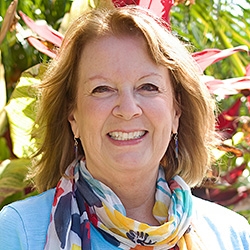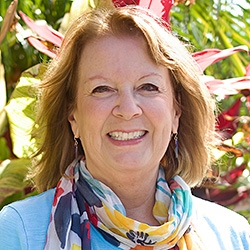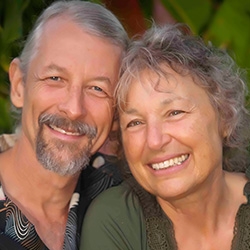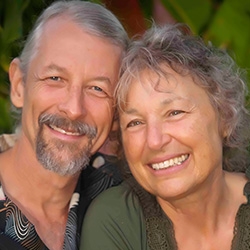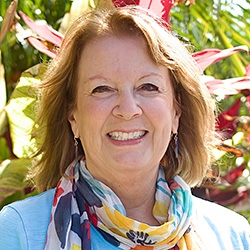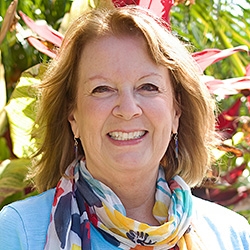

Search Results: acknowledgment
-
How do our nervous systems sync during connection, and what happens when disconnection occurs? In this Sarah Peyton video, we explore the profound interdependence of human relationships through the lens of Nonviolent Communication (NVC).
-
NVC trainer Sarah Peyton explores the process of repairing relationships through the lens of Nonviolent Communication. She emphasizes the importance of self-connection and empathy—both for ourselves and others—when addressing moments of hurt or disconnection.
-
Miki Kashtan explores how to respond to group conflict wisely when you’re not directly involved.
-
This holiday, shift your focus from what disappoints you to the true whisperings of your heart. Compassion is an inside-outside process. In this telecourse recording, you will experience four simple tools for savoring your own precious needs, allowing you to experience greater compassion and harmony this holiday.
-
In pandemic many are asked to stay home. If we are experiencing violence at home we're also most at risk of harm or death if we leave. There are also less visible pieces at work. In this situation, acknowledging our pain, needs and experience can lighten the internal load to meet what is real, and claim our truth. We can do the same for our kids. This can open more pathways forward, and provide strength to leave when its more viable.
-
Repairing betrayal may include rebuilding self trust, getting support, empathy on both sides over time, and new agreements. Even though your (in)actions don't "cause" someone's behavior, acknowledging any part you played in creating conditions for the behaviors to arise, can support repair. Trust builds slowly as new skills, ways of relating and experiences that reflect honesty, self responsibility, and respect are consistent over time.
-
Kelly Bryson explores courageous honesty and how truth shared openly deepens connection.
-
Trainer Tip: To reduce defensiveness and hurt feelings when talking to your partner about your sexual needs that haven't been met, keep the conversation focused on your needs, not her lack of skill, and make a very specific request. From there, you can both explore any shared needs, blocks, or support needed to bring you both closer to your needs.
-
Dear friends,
Happy April Fool’s Day, which, according to Wikipedia, “is an annual custom on April 1st consisting of practical jokes and hoaxes.” I always think of my Mom on April Fool’s Day. She was mostly a stern person who scorned practical jokes, but on April Fool’s Day, she would play hoaxes on my father. One year, she...
-
Join veteran Mediators and Facilitators, Jori and Jim Manske in using Nonviolent Communication and mediation skills for transforming conflict into connection between yourself and others.
-
Join CNVC Certified Trainers and Mediators Jori and Jim Manske in an exploration of using Nonviolent Communication in the context of Mediation and Conflict Resolution.
-
"All humans share the same needs" -- tragically, this idea can hide the reality that some people with less power in society have needs that go unmet to a greater extent, much longer, and with more dire consequences. Often, when the marginalized bring up experiences related to their membership in a certain group, their pain isn't acknowledged, and focus shifts to the listener's discomfort. The concept of universal human needs can be used to silence and minimize their pain. Read on for how to proceed.
-
Trainer Tip: Even when it's tempting to coerce or match might with might, we can strive to meet our needs without negatively affecting others. Instead of convincing anyone to do it our way or to value the same things we value, we can focus on what we value: compassion among people and valuing everyone’s needs. By doing this we are actually more likely to meet our own needs and we are better able to live peacefully.
-
Trainer Tip: Censoring oneself to maintain peace may seem easier, but it actually requires significant energy. You can free up that energy you use to deny and stuff down your feelings, needs, desires, truth, and figure out and adjust to what others want. Embracing authenticity and expressing true feelings and needs can lead to a liberating experience, unlocking joy, love, and endless possibilities.
-
Our brains often quickly categorizes things as good, bad, right, or wrong and then determines who’s to blame or praise. Maybe this supports the illusion of order and predictability, thus provides a false sense of safety and reassurance. But its less effective in truly meeting our needs. By practicing "Living in the Observation," we can focus on reality, avoid unhelpful rumination, and find peace and empowerment in everyday life.
-
Interested in bringing NVC consciousness to your workplace, but want to use a natural and conversational way of speaking? Listen in as Jeff describes three specific skills you can apply immediately: #1: How to express your understanding of a co-worker’s needs; #2: How to apply the three dimensions of needs in a business setting; and #3: How to make a Symbiotic Request that acknowledges holding multiple needs.
-
Have you ever said 'I'm Sorry' to someone, only for it to leave you feeling disappointed and lacking connection? In some cultures, saying 'I'm sorry' has become too easy and is used for all sorts of situations. Whether it's just to excuse yourself as you pass in front of someone taking a photo, or if you've truly hurt a close friend. So when we really need to communicate regret, how can we do so in a way that acknowledges the situation and the connection?
-
Ask the Trainer: Dealing with judgments about you when the speaker's true unmet need is hidden.
-
Penny Wassman shares this first workshop exercise as an opportunity to build connection.
-
Exploring how stories and unmet needs each influence the cause of our feelings in NVC.

Quick Links
Subscription Preferences
Stay In Touch!
Looking for ways to keep up with NVC Academy news, get special offers, free resources, or words of inspiration? Here are five ways to stay engaged:




